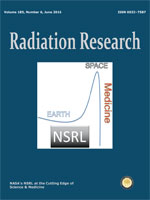In this study, nonhuman primates (NHPs) exposed to lethal doses of total body irradiation (TBI) within the gastrointestinal (GI) acute radiation syndrome range, sparing ∼5% of bone marrow (TBI-BM5), were used to evaluate the mechanisms involved in development of the chronic GI syndrome. TBI increased mucosal permeability in the jejunum (12–14 Gy) and proximal colon (13–14 Gy). TBI-BM5 also impaired mucosal barrier function at doses ranging from 10–12.5 Gy in both small intestine and colon. Timed necropsies of NHPs at 6–180 days after 10 Gy TBI-BM5 showed that changes in small intestine preceded those in the colon. Chronic GI syndrome in NHPs is characterized by continued weight loss and intermittent GI syndrome symptoms. There was a long-lasting decrease in jejunal glucose absorption coincident with reduced expression of the sodium-linked glucose transporter. The small intestine and colon showed a modest upregulation of several different pro-inflammatory mediators such as NOS-2. The persistent inflammation in the post-TBI-BM5 period was associated with a long-lasting impairment of mucosal restitution and a reduced expression of intestinal and serum levels of alkaline phosphatase (ALP). Mucosal healing in the postirradiation period is dependent on sparing of stem cell crypts and maturation of crypt cells into appropriate phenotypes. At 30 days after 10 Gy TBI-BM5, there was a significant downregulation in the gene and protein expression of the stem cell marker Lgr5 but no change in the gene expression of enterocyte or enteroendocrine lineage markers. These data indicate that even a threshold dose of 10 Gy TBI-BM5 induces a persistent impairment of both mucosal barrier function and restitution in the GI tract and that ALP may serve as a biomarker for these events. These findings have important therapeutic implications for the design of medical countermeasures.
How to translate text using browser tools
25 May 2016
Mechanisms Involved in the Development of the Chronic Gastrointestinal Syndrome in Nonhuman Primates after Total-Body Irradiation with Bone Marrow Shielding
Terez Shea-Donohue,
Alessio Fasano,
Aiping Zhao,
Luigi Notari,
Shu Yan,
Rex Sun,
Jennifer A. Bohl,
Neemesh Desai,
Greg Tudor,
Motoko Morimoto,
Catherine Booth,
Alexander Bennett,
Ann M. Farese,
Thomas J. MacVittie
ACCESS THE FULL ARTICLE

Radiation Research
Vol. 185 • No. 6
June 2016
Vol. 185 • No. 6
June 2016




